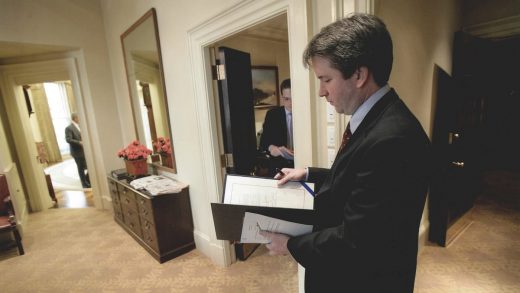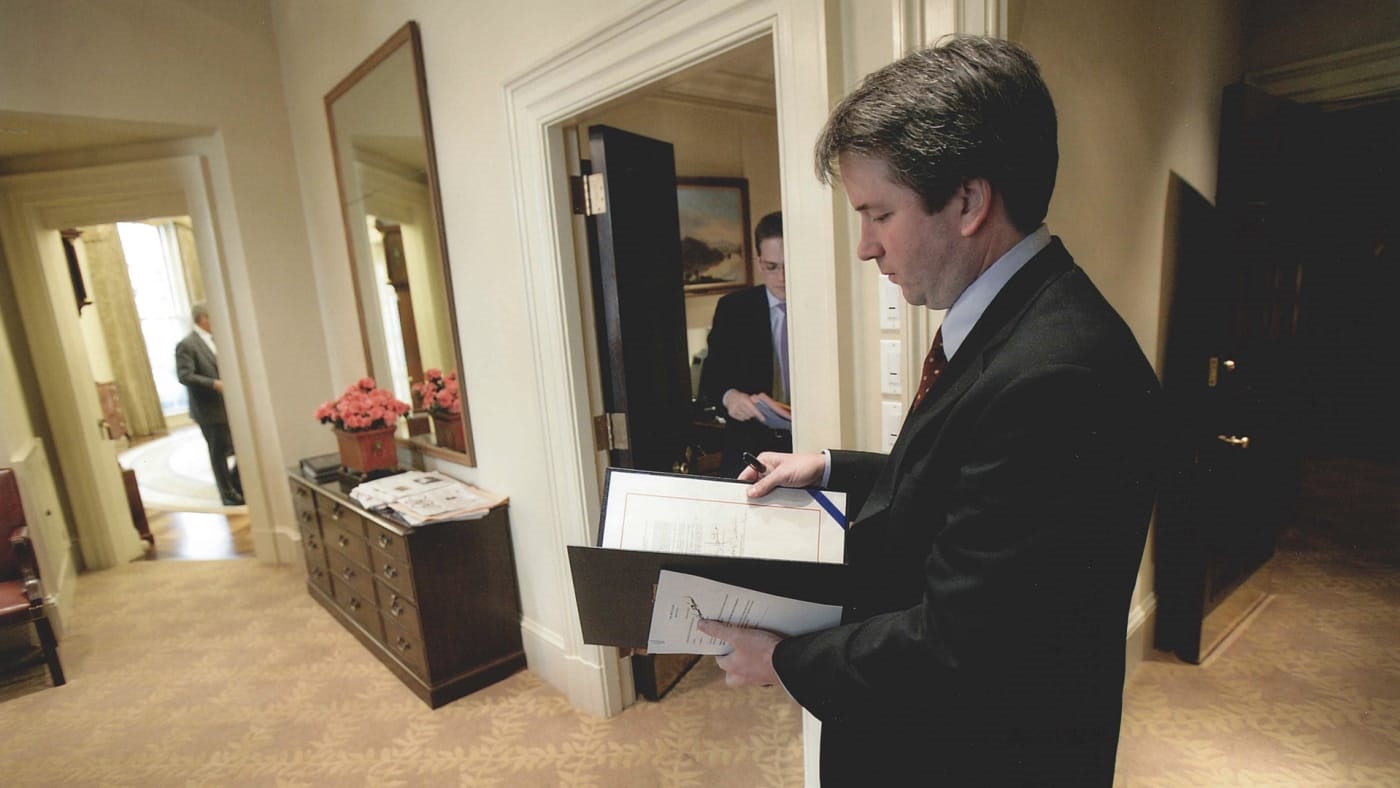As Bush aide, Kavanaugh sent 227 emails about “surveillance,” raising questions about his role
It took a last-minute Freedom of Information Act lawsuit against the National Archives, but the Electronic Privacy Information Center (EPIC) has uncovered that Supreme Court nominee Brett Kavanaugh may have played an important role in some of the Bush administration’s most questionable surveillance programs just after the 9/11 attacks.
EPIC learned from the archives that Kavanaugh, while working as a top White House aide, sent 227 emails to other staffers concerning “surveillance” and the “Patriot Act.” EPIC Senior Counsel Alan Butler told me it’s unusual that the word “surveillance” would be used in email communications among lawyers in the executive branch under normal circumstances. The word is more likely to appear in the context of discussions about the legality and constitutionality of specific programs or practices.
The existence of the emails raise serious questions about Kavanaugh’s involvement in–and judgement over–the administration’s warrantless wiretapping programs, the Patriot Act, the “CAPPS II” passenger profiling program, and the “Fusion centers” that databased large amounts of personal data on U.S. citizens gathered from a variety of public and private sources.
Kavanaugh also sent 11 emails to John Yoo, the lead attorney on the Bush administration’s warrantless wiretapping program, which was later curtailed by the U.S. Congress. Butler told me Kavanaugh exchanged at least one email with Yoo concerning “surveillance” and the Fourth Amendment. Yoo is also known for writing the early legal opinions that seemed to provide the legal cover for the administration’s most notorious interrogation practices, like waterboarding. Both those opinions, known as the “torture memos,” were later rescinded by the DOJ Office of Legal Counsel. After taking office, President Obama used an executive order to repudiate and rescind all of Yoo’s legal opinions concerning interrogation.
Based on the preliminary data from the archives, EPIC sent a letter to the ranking members of the Senate and ranking members of the Judiciary Committee Wednesday night asking that Kavanaugh’s nomination process and final vote be delayed another week. The proposed delay is intended to give the archives enough time to release the full content of the Kavanaugh emails. The Judiciary Committee acknowledged receipt of the letter, but has not responded to its substance.
Butler told me the Judiciary Committee had already received a subset of the Kavanaugh email information via a “special access” request to the National Archives when Kavanaugh was chosen as the nominee for the high court. When the staff of committee ranking member Chuck Grassley learned of EPIC’s findings on Wednesday, Bulter told me, they began their own investigation of the Kavanaugh emails on surveillance. The results of that work are unknown.
EPIC sued to gain access to Kavanaugh’s email while he worked for Bush between 2001 and 2006. Kavanaugh joined the Bush campaign while it was trying to stop the Florida recount in 2000, then, after Bush became president in 2001, became an associate in the Office of the White House Counsel. In 2003 he became White House Staff Secretary. The archives holds 170,000 records of emails that Kavanaugh sent, received, or was copied on while an associate. It holds another 475,000 such records from when the Kavanaugh was Staff Secretary.
The release of the email data was no small matter. The Kavanaugh email records actually belong to the George W. Bush Presidential Library, which is part of the National Archives. George W. Bush hired an attorney to represent him personally during the process of deciding which records could be released. By the time the Kavanaugh email records reached the Judiciary Committee, their scope and number had been managed by Bush, the archives, the Department of Justice, and the Trump White House.
“This is yet another area where Brett Kavanaugh’s record is being concealed from the American people,” said Senator Ron Wyden (D-Oregon) in a statement.
Kavanaugh denied having any knowledge of, or role in, the post-9/11 surveillance work when questioned by Senator Patrick Leahy (D-Vermont) during the hearings. “The fact that he appears to have had so many conversations about a topic that he denied having involvement with, under oath, raises even more questions.”
The EPIC email discovery isn’t likely to stop the vote on Kavanaugh’s nomination on Saturday, and it appears that the GOP has enough votes to send the controversial nominee to the court. But two things are clear: Brett Kavanaugh has been a highly political and partisan figure, and there’s still a lot we don’t know about his past.
(48)



